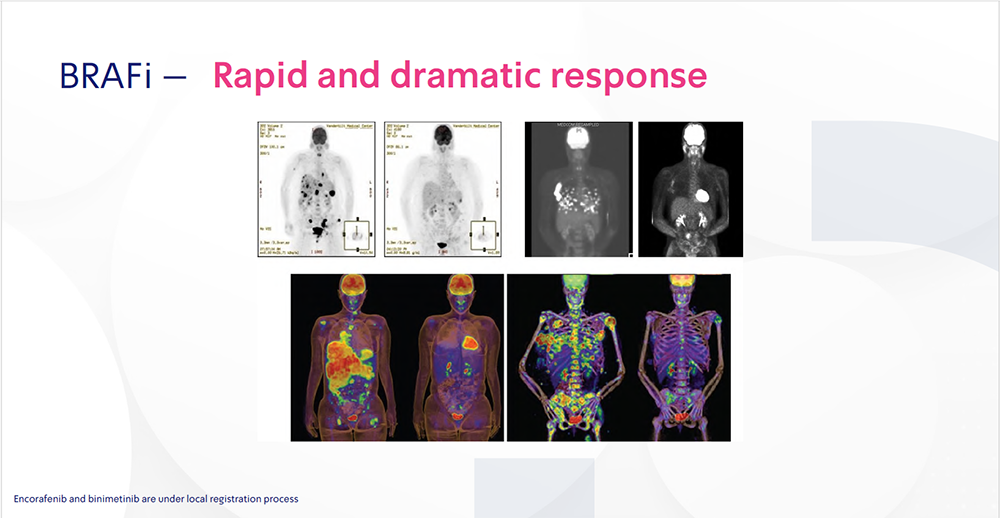Clinic for treatment of melanoma and skin cancer
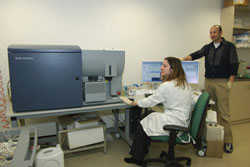
The Clinic is an outstanding and exceptional Medical Center, whose work is unparalleled in the field of research, diagnosis and treatment of melanoma and skin cancer.
The Clinic creates an unique treatment program specifically for each patient and, if necessary, for his family on the basis of the most advanced methods.
The success of treatment for melanoma in Israel is a collaboration with leading medical institutions around the world, which have innovative and specialized treatments of melanoma and skin cancer.
Melanoma is a type of cancer originating in cells that produce the pigment melanin in the skin. These are the cells responsible for pigmentation of the skin - light or dark. In recent years there has been a sharp increase in the incidence of this disease.
Till now, the actual cause of the disease remains unknown. Greater risk of developing melanoma have the people with fair skin, red hair color, blue eyes, and those who can easily "burn" under the sun. Among people with dark skin melanoma is very rare.
An important risk factor for the disease is an exposure to sunlight, especially during peak hours of the heat. It is unknown, however, whether there is connection between the use of protective creams against the sun and the frequency of the disease or not.
To diagnose melanoma is a simple task even at its early stage. Every mole or spot that change color, size, itching or bleeding should undergo a thorough check by a dermatologist and plastic surgeon. Delete suspicious spots or moles is not a time consuming process.
The clinic also uses computer diagnostics-- dermoscopic images of pigmented lesions on the skin in order to check for possible cancer.
Procedures
Early diagnosis of melanoma.
Progressive non-invasive diagnosis of skin cancer.
Dr. Alon Scop, a leading doctor of the Department of Dermatology at Chaim Sheba Hospital is worldwide known for the researcher and a lecturer on an early, non-invasive diagnosis of the skin cancer.
In 2009, Dr. A. Scop was awarded with the rare title of an Outstanding Researcher in the field of dermatoscopy by the International Dermoscopy Society.
He is continuously collaborating with colleagues from Memorial Sloan-Kettering Cancer Center and Mayo Clinic ( both of them in the United States) , which are known centers in the field of dermatology.
The main Dr. A. Scop's responsibilities are in Dermatology Department, where his is working on an early diagnosis of melanoma, SCC, BCC and other types of cancer, monitor patients at risk (patients with multiple moles, a history of melanoma or other types of skin cancer in the past) or their relatives.
For early diagnosis and monitoring of melanoma and other cancers, Dr. Skop provides the following methods:
- Dermatoscopy
- Radioisotope scanning of the whole body
- Confocal microscopy
Dr. Skop also helps patients overcome the complications of chemotherapy, which appeared on the skin.
Dermatoscopy
is a noninvasive diagnosis of melanoma, carried out by a small device that can ten-fold increase images of skin layers. Multiple studies have shown that use of the Dermatoscope significantly improved ability to diagnose melanoma and to distinct it from other types of skin cancer or tumors.
Confocal microscopy is a noninvasive method for early diagnosis of skin cancer. Employing a weak infrared device, this technology enables physicians to see a composition of the internal and external layers of skin tissue at the cellular level. Actually, this method could be compared with noninvasive, virtual biopsy that show the highest accuracy results at an early stage of skin cancer development.
Confocal microscopy is an exclusive method of examination, which is carried out in the leading oncology academic centers in Europe and America only.
Technology is approved by the FDA and the appropriate U.S. organization as absolutely safe method for the skin and not harmful to the health of the patient as a whole.
Radioisotope scanning of the entire body is a non-invasive method for early diagnosis of skin cancer. The diagnosis is based on information obtained during the high resolution and supreme accuracy scanning of the whole body.
The primary scan is carried out in order to get a basic picture of the disease, and subsequently these photos are used for rigorous monitoring of skin lesions.
A distinctive feature of the skin cancer is an increased size of the skin lesions, a change of their color and form, which is associated with uncontrolled cell proliferation. After an initial survey, patient receives the digital copy of pictures in the form of CD-ROM, and thus is able to independently carry out a comparative analysis of the skin.
Treatment of melanoma in accordance with the stages of development.
Melanoma primary stage
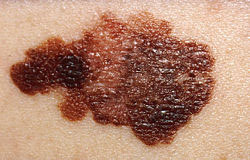
In most cases, melanoma is diagnosed at an early stage, when the edges of the lesion have a clear boundary and a thin layer. Treatment of melanoma in Israel includes, above all, surgical removal of the affected layer and its subsequent thorough pathological analysis to determine the depth of penetration (measured in millimeters) of tumors in the inner layers of the skin. The result of pathological analysis determines the mode of further treatment.
Melanoma penetration into the inner layer of the skin up to 1 millimeter
If the pathological results confirmed melanoma penetration into the inner layer of the skin up to 1 millimeter, then the next step will be performed as a surgical intervention to prevent the spread of the disease. Thus, cut off a wider field at a distance of one - two centimeters from the previous specimen.
Melanoma penetration into the inner layer of the skin for more than 1
In this case it is necessary to conduct a survey for the presence of secondary foci - metastasis. If metastases are detected, there is a need to check the lymph nodes.
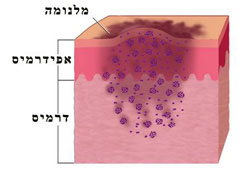
The minimum amount of a radioactive drug is introduced into the lymphatic system. After the detection and removal of affected lymph nodes closest to the primary tumor, pathological examination is carried to assess the presence of cancer cells in the obtained specimen.
This procedure is most accurate in forecasting terms for early diagnosis of cancer spread to lymph nodes. In case of detection of cancer cells, more extensive surgery to remove lymph nodes is performed.
The final stage of treatment is an adjuvant therapy to prevent a further spread of cancer. Therapy with the interferon is used as a biological treatment method. To prevent relapse sometimes radiation therapy is used as well.
The spread of melanoma to distant organs (metastasis)
In very rare cases, the diagnosis of melanoma is done on the stage of metastasis. In this situation, a systemic treatment using combination of biological drug and chemotherapy, is the only option. Choice of drugs and their doses are based on the study of pathology of the patient.
Treatment of melanoma in Israel is carried out by several methods:
- therapy using Interleukin 2
- chemotherapy combined with biological therapy
- treatment in a frame of clinical trials
- latest cellular immunotherapy treatment by using the TIL
- maintenance therapy to relieve symptoms of the disease
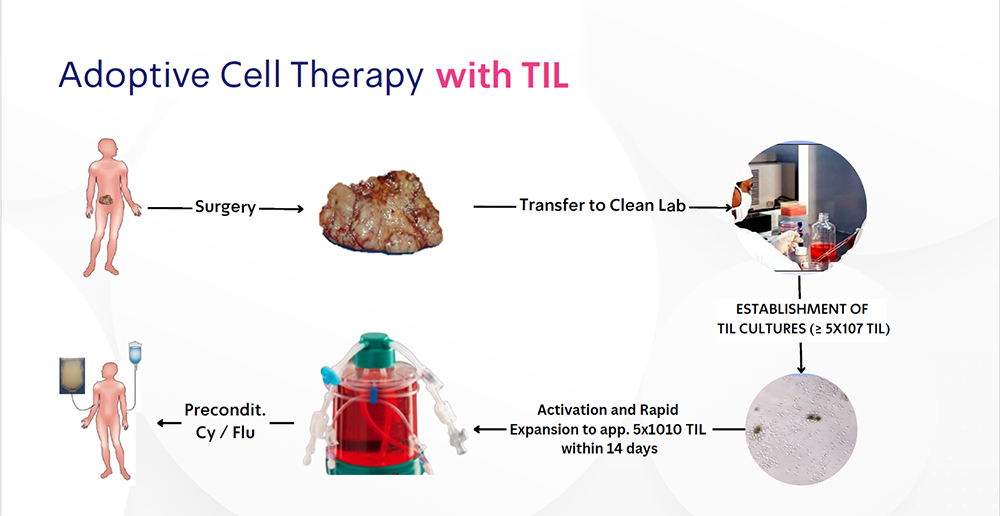
The Department is constantly conducting active clinical research, results of which are used in designing novel, improved therapeutic regimens to treat melanoma in Israel:
-
Treatment of melanoma at metastases stage using cellular immunotherapy-- Adoptive Immunotherapy.
Despite the fact that this technology for the treatment of skin cancer is still under evaluation, it has already received positive and encouraging results that generated an interest in leading clinics around the World.
This technology is designed to increase natural immune response to cancer cells.
Typically, a malignant tissue is surrounded by T lymphocytes, role of which is neutralization of the tumor and preventing its formation.
Due to the limited number of T cells, they cannot effectively inhibit tumor cell proliferation. The aim of the method is the enhance T cell proliferation and increase their number and, thereby, to boost their efficiency and thus to assure a destruction of cancer cells.This study takes place only in two places: in the Clinic for the Treatment of Melanoma at the Chaim Sheba Hospital and in NIH (the American Institute of Health). Dozens of melanoma patients, including patients from various countries, have been successfully treated in the Clinic by the lymphocytes infiltration method.
Description of the method
A site for the harvesting T cells is selected from the surgically removed tumor. T cells in this part of tumor are as close to the cancer cells as they could be and, for this reason, their majority had already acquired the ability to identify and destroy diseased melanoma tissue.
The harvested T cells are grown and propagated in the laboratory under special conditions that increase their ability to neutralize melanoma cells. The number of T cells is increased to several million, and therefore their affinity to melanoma cells of this particular patient is increases many folds times as well.
After completion of chemotherapy, the patient receives millions of his/her newly grown T cells intravenously, together with the preparation of IL-2, which strengthened the impact of T cells on the melanoma cells.
-
Study of efficacy Re-PTI-6D2 in the treatment of melanoma at the stage of metastasis.
This drug acts as a radioactive antibody that binds to melanin located in the cell melanoma.
-
A clinical trial of safety and efficacy of Allovectin-7 compared with drugs Dacarbazine (DTIC) and Temozolomide (TMZ) in patients suffering from melanoma at the stage of metastasis.
A clinical studies are conducted (1) with a drug Allovectin-7 which injected directly into the tumor or (2) during chemotherapy using the drugs Dacarbazine (DTIC) injected intravenously, as well as, Temozolomide (TMZ) administered orally.
Allovectin-7 is a drug that contains a gene that produces a protein called HLA-B7. The protein penetrates into the cancer cells and, thus, they become recognizable by immune system, which enables it to specifically attack the tumor foci.
Dacarbazine (DTIC) is a chemotherapy drug approved by the Administration of the American Association of Drugs as chemotherapeutic agent for the treatment of melanoma at the metastasis stage.
Temozolomide (TMZ) is a chemotherapy drug approved by the Administration of the American Association of Drugs as chemotherapeutic agent for the treatment of other types of cancer - astrocytoma. But despite this, the drug is actively and successfully used in the treatment of melanoma.
During clinical studies, patients are randomly assigned to one of two groups, which are different in their treatment regimens. The first group will receive treatment with Allovectin-7 only , and the second group will receive drug Dacarbazine (DTIC) and Temozolomide (TMZ)
-
A clinical trial of safety and efficacy of treatment of stage IV melanoma drugs SAT-4783 and PACLITAXEL compared with reliability and efficiency of drug treatment only PACLITAXEL.
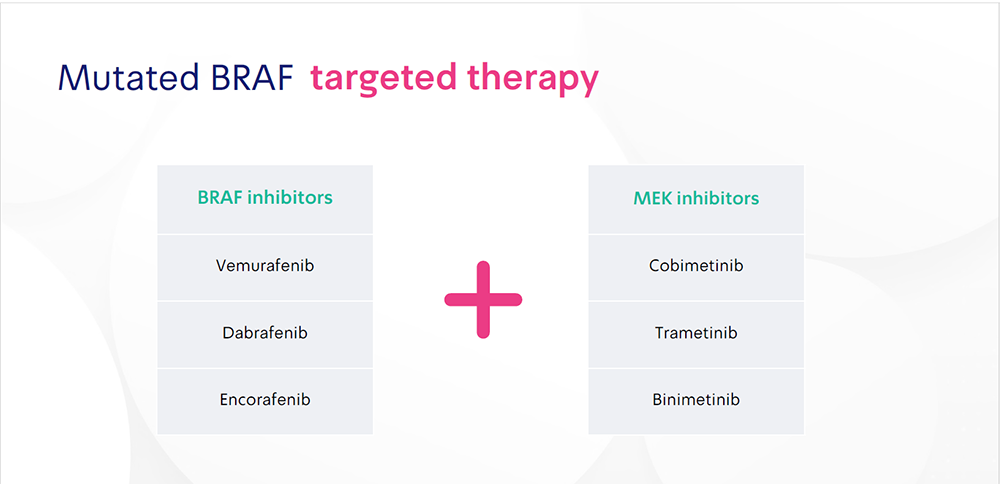
Attending staff:
Attending staff is acting in a frame of Chaim Sheba Cancer Hospital, which is led by Professor Rafael Katan, and Cancer Research Center, which is headed by Professor Gidi Rahbi.
Professor Gidi Rahbi.Specialty: Pediatrics, Hematology, Pediatric Hematology |
 |
Professor Raphael Katan - Head of Chaim Sheba Cancer Centre, a teacher at the Faculty of Medicine at Tel Aviv UniversitySpecialty: clinical oncology, radiotherapy, breast cancer, GIST, general oncology, palliative care Research activities: treatment of metastasis to the bone by means of focused ultrasonic radiation under MRI. |
 |
Professor Jacob Schachter.The Head of the Research and Treatment of melanoma and skin cancer. Deputy Oncology Unit at the Chaim Sheba Hospital Specialty: oncology and radiotherapy |
 |
Dr. Dov Zifel. Head of intra-abdominal chemotherapy.Expertise: general surgery, oncologic surgery. |
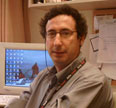 |
Dr. Avi Tarbes.Deputy Head of the Research Cancer Center. |
 |
Dr. Roni Shapira.Specialization: treatment and research melanoma skin cancer, internal medicine, oncology. |
|
Dr. Gal MarkelDeputy of Head of the laboratory for clinical treatment and melanoma research |
 |
Dr. Alon Scope.Specialization: Dermatology.Early diagnosis and treatment of skin cancer |
 |
